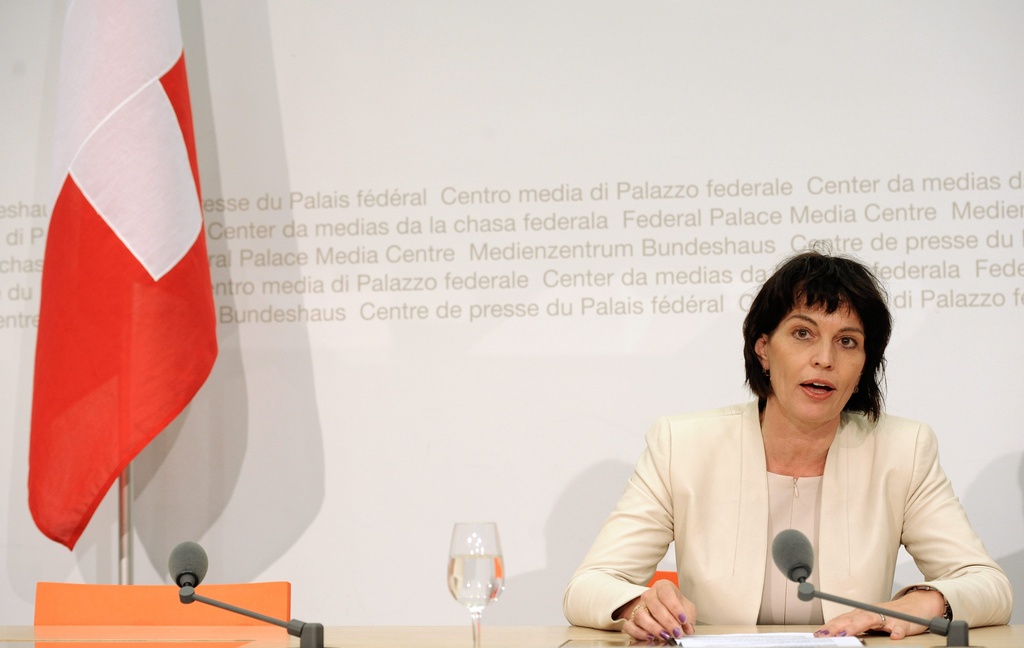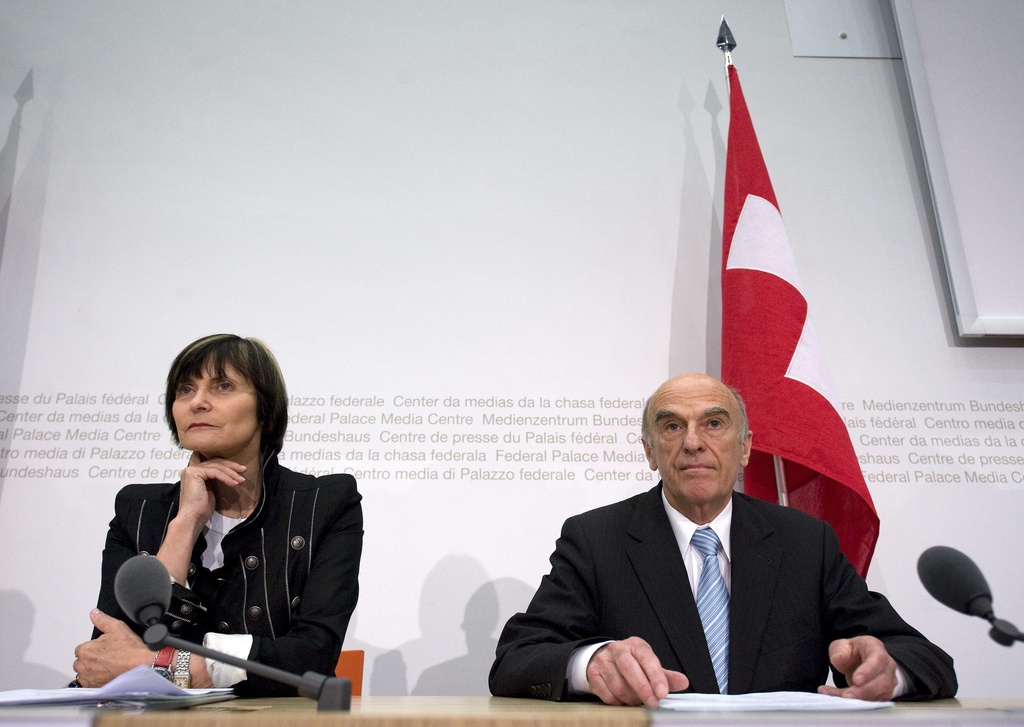Merz “acted like a Sarkozy” over Libya

The foreign ministry’s reaction to the Libyan crisis may have been swift, but the government’s overall handling showed shortcomings, says a security expert.
Daniel Möckli, who has recently published an analysis of the case, tells swissinfo.ch that the European Union’s intervention was also key.
It has been just over a month since the second Libyan hostage Max Göldi returned to Switzerland, but the Libya affair is hardly over.
An international tribunal will judge the temporary arrest in Geneva of Hannibal Gaddafi, a son of Libyan leader Moammar Gaddafi. The incident in 2008 triggered the diplomatic crisis.
Möckli, from the Federal Institute of Technology Zurich’s Center for Security Studies, has divided the crisis into three phases: the Swiss foreign ministry’s diplomatic attempts to resolve the situation until summer 2009, Swiss President Hans-Rudolf Merz’s crisis management and subsequent – failed – trip to Libya and, finally, mediation by the EU from spring 2010 onwards.
swissinfo.ch: What was special about the Libya crisis, in comparison with earlier crises?
Daniel Möckli: For Switzerland it was an extraordinary and very difficult crisis. It wasn’t about hostages being taken by a rebel group, which is typically the case when Switzerland is confronted with hostage issues. Instead it was a nation – Libya – that had taken hostages as collateral in the dispute over the arrest of Hannibal Gaddafi.
Switzerland was also confronted with a country that used means that it couldn’t take itself, such as pseudo-legal measures.
swissinfo.ch: Was Switzerland aware of its opponent’s methods?
D.M.: I think so. But it took into account too late that the Gaddafi family honour was at the heart of the dispute. It focused for a long time on diplomacy as a solution. In retrospect, it is clear that it spent too long negotiating with the prime and foreign ministers. Moammar Gaddafi is Libya’s chief decision maker.
swissinfo.ch: Your study divided the crisis into three phases. Can you explain some more?
D.M.: In the first phase the foreign ministry reacted very fast and comprehensively, one can’t reproach them there. In retrospect, a quick solution to the crisis might have been possible had there been an apology for the excessive course of action during the Geneva arrest.
The second phase was obviously characterised by the lack of coordination at cabinet level. The ministries were not all pulling in the same direction during crisis-management planning. In addition, public criticism came after Merz’s trip to Libya ended in failure. These serious shortcomings in crisis management have brought up the question of a reform of the government.
The third phase saw the cabinet’s recognition that it also had to apply pressure. This also happened through Schengen [the blocking of around 180 high-ranking Libyans from entering the whole single-border European area]. Bringing Europe into the equation was very successful, because Libya’s retaliation measures against the Schengen states resulted in the EU getting involved in resolving the conflict.
swissinfo.ch: Was the size of crisis underestimated?
D.M.: Not necessarily at a federal level in Bern. Geneva probably underestimated the consequences. The starting point was that Geneva did not want to apologise for the way Gaddafi’s son was arrested.
The canton argued very legalistically, saying that it had not broken any laws. Thus Geneva had to take on board an escalation of the conflict. A little more political intuition and the crisis might well have been resolved faster.
swissinfo.ch: You said that the release of the hostages was a success, but that the handling of the crisis showed weaknesses. But Göldi was held for more than two years.
D.M.: It is a success for Switzerland that Göldi was freed before the international tribunal started. This was not given, as Libya initially wanted to wait for the tribunal’s verdict before dealing with the Swiss hostages issue. Tripoli denied any link between the Swiss citizens’ arrest and the Geneva incident for a long time.
Of course, two years was a far too long a time for the hostages. But we know that similar crises have lasted even longer in Libya. Overall, Switzerland got off quite lightly.
swissinfo.ch: What lessons could be learned leadership-wise?
D.M.: The leadership deficit partly has to do with the people, but at its core, it is due to the system. A cabinet without an authorised head of government always finds it difficult to manage a crisis. We must therefore think about where the deficits are in the Swiss governmental system.
swissinfo.ch: After Merz’s trip, it seemed as if there was a communication problem.
D.M.: Yes. Merz went to Tripoli without enough coordination. He signed an accord there which is pretty far from the foreign ministry’s original negotiation guidelines. He acted almost as if he were head of government, which we don’t have in our system. Merz was more like a [French president] Nicolas Sarzoky than a Swiss president. Had he brought the hostages back though, he would not have been so criticised.
swissinfo.ch: What happens now?
D.M.: The action plan will now be started. Switzerland has already transferred a compensation payment into a blocked account for the publication of the police photos of Hannibal Gaddafi. The tribunal will get to work judging the Geneva arrest. The Swiss parliament will also investigate the government’s crisis management. The topic is bound to be around for a while.
Mohamed Cherif, swissinfo.ch (adapted from French)
The government’s crisis management has not been the only issue that has come under fire. It has also come to light that some cabinet members had planned a secret hostage rescue action.
The question of who knew what and when and who gave the order is still not clear.
The issue is likely to be part of a report by the parliamentary control committee, which is looking into the government’s handling of the Libya crisis. The results are expected next spring.
Some political parties have called on the report to be made available this year because of the cabinet elections.
Möckli is senior researcher at the Center for Security Studies at the ETHZ. He studied in both Britain and Switzerland.
His areas of expertise are European foreign and security policy since 1945, European-American relations and the Middle East, and Swiss foreign and security policy.
Möckli is the editor and frequent author of the monthly CSS Analysis in Security Policy, which offers a discussion of current trends and developments in international security and strategic affairs.
The July edition was entitled: The Libyan Affair: Afterthoughts on Swiss Crisis Management.

In compliance with the JTI standards
More: SWI swissinfo.ch certified by the Journalism Trust Initiative












You can find an overview of ongoing debates with our journalists here . Please join us!
If you want to start a conversation about a topic raised in this article or want to report factual errors, email us at english@swissinfo.ch.